Awe Reminds Us Of The Universe's Largeness
The mind is a machine that is constantly asking: What would I prefer?
My friend Devon Price recently published a fantastic book called Laziness Does Not Exist. It’s a thoughtful, well-researched bit of scholarship that also happens to be packaged as self-help—I found myself nodding along through its chapters, seeing on the page many things I probably knew on some level to be true but had never seen articulated or connected so helpfully.
I wrote a review of the book for Jacobin magazine a few weeks ago, the first time in ages that my name has appeared in print somewhere other than this newsletter. That review mostly deals with the way that capitalism depends on our belief in what Devon calls the “Laziness Lie” and the nefarious ways the self-help industry perpetuates those harmful structures.
But there’s a part of his book I didn’t get to address in that review that I have been thinking about a lot lately, as my own life—full as it is with teaching and committee work, a marriage, a recent move, union organizing, writing, the need to be fed and to exercise, among other things—has started to feel like it’s starting to spiral into a vortex of busyness from which I might never emerge. This piece I’m thinking about comes from a chapter titled “Your Achievements Are Not Your Worth,” which is easy to remember in the negative (in 10 seconds how many rich successful shitheads can you name that don’t deserve an iota of it, go) but harder to remember in the positive, in my own life.
Devon writes at length about how the gamification of our world and all the achievement-hunting it creates precludes people’s ability to savor things. We have gotten into the habit of judging our experiences by the external gratification they provide (Instagram likes, retweets, and so on) rather than judging them on their own merits, on what they’ve done for us internally. Savoring, he writes, “is the process of deeply and presently enjoying a positive experience.” Process is the key word—not just the moment of enjoying a thing itself, but also the anticipation of that moment, and the gratitude for that moment once it has passed.
All of this sounds simple enough—maybe even obvious—until I pause and think about how infrequently I engage in that process in its totality. So after reading Devon’s book I have been trying to be more intentional about savoring my morning coffee. Coffee isn’t just functional for me; I like the silly little ritual of inhaling the scent and grinding the beans and timing the French press. But even knowing this, if I am in a particular hurry before school (which I often am) or am distracted (which I am even more frequently), I can be done with half a cup before I’m even conscious of the fact that I’ve been drinking it. This has consequences for me, because I have other smart friends besides Devon and one of them, Julie, is a nutritionist who has convinced me to limit myself to 12-16 oz a day. So if I finish half my mug while I’m on autopilot, I have denied myself the ability to really enjoy something before I have to spend the day working.
What I am practicing instead is taking my coffee out on the balcony and getting a few minutes of fresh air while I drink it, which forces me to pay attention to what I’m doing, and allows me to rest my eyes on the mountains to the west if the day is clear. Sometimes I take a handful of peanuts with me and flick them onto the street below for the crows, who are starting to learn that my presence means the possibility of a snack.
I used to be better at this, at paying attention to things in their fullness, which is a necessary precondition of savoring. When I was 25, for a period of time I had no job but to hike north from Mexico to Canada, which I reasoned would pay me back later if I could write a book about it. (It has, technically, but I shudder to think what my hourly wage for that effort works out to be.) When you have nothing to do all day but walk, and that distance has to be closed one way or another, well, you sort of have to start paying attention. Frankly there’s not a whole lot else to do unless you’re the kind of person who can retreat inward and experience your own mind for 10-12 hours at a stretch.
I wrote in my own book that my mom has spent my whole life giving me the same piece of advice: “Be where you are.” Good advice is, definitionally, the most difficult to follow. But maybe that’s all that savoring really is: a willingness to be present, to try to experience events in real time instead of surrendering to the constant insatiable state of longing for something else that you might be doing instead.
It is this state of mind that creates room for what Devon correctly describes as awe. Awe, he writes,
occurs when we encounter something completely new or deeply inspiring…Awe reminds us of the universe’s largeness and our own smallness, in a way that feels exhilarating and soothing rather than threatening.
I have never experienced such a sustained state of awe as when I was walking that long trail north. But I would be kidding myself, and you, if I said that a large portion of that experience wasn’t still grueling boredom and dissatisfaction—at not being with the people I loved, at not having the food or rest I desired, at the mosquitoes, at the heat and the cold…you name it. Awe, like anything else, seems to require the existence of its opposite in order to have meaning.
It was while I was out there, fortunately, that I encountered this George Saunders essay about the legendary (and now, sadly, infamous) “Buddha Boy.” He wrote something there that I come back to often, which I think speaks to this same state of dissatisfaction:
The mind is a machine that is constantly asking: What would I prefer? Close your eyes, refuse to move, and watch what your mind does. What it does is become discontent with that-which-is. A desire arises, you satisfy that desire, and another arises in its place. This wanting and rewanting is an endless cycle for which, turns out, there is already a name: samsara. Samsara is at the heart of the vast human carnival: greed, neurosis, mad ambition, adultery, crimes of passion, the hacking to death of a terrified man on a hillside in the name of A More Pure and Thus Perfect Nation—and all of this takes place because we believe we will be made happy once our desires have been satisfied.
I know this. But still I'm full of desire.
There is nothing fundamentally wrong with desire, of course, and in a country where so many have so much robbed from them that we haven’t achieved a baseline of need or deserve, much less want, it can feel borderline reactionary to advocate for people to want less. But I think there’s a difference between wanting less, period, and wanting less often, when there is still something to be gained from a moment if we only trained ourselves to wait for it. It would be nice if the people who rule the world would do the former and the rest of us did the latter, I mean.
I was obviously spoiled, hiking the Pacific Crest Trail, in that there was awe to be had everywhere and I didn’t have to work to find it. Mountain vistas rising like a mirage off the desert floor. Wildflower blooms and raging rivers. Bears, rattlesnakes, marmots. Staggering stuff big and small, to be had just about everywhere. But something I appreciated about Devon’s book is that he reminds his readers that everyone has the capacity to make time for awe, whether or not they ever sally forth into the virgin wilderness.
In fact, I think limiting the idea of awe to what can be experienced in nature can be detrimental, as it prevents us from seizing those moments when they arrive elsewhere. The last page of The Great Gatsby has the one killer line about boats that everyone remembers, but it also contains the following passage:
…for a transitory enchanted moment man must have held his breath in the presence of this continent, compelled into an aesthetic contemplation he neither understood nor desired, face to face for the last time in history with something commensurate to his capacity for wonder.
A lot of us buy into Nick Carraway’s nostalgia here—that awe is what we are allowed in brief glimmers when we manage to find a piece of “unspoiled” wilderness, that previous ages and eras were the only time to really experience something commensurate with our capacity for wonder. But that’s not true at all.
On his blog recently, Austin Kleon compiled some snippets from other people talking about why they write on the internet or make art. The common theme was that none of them are doing anything particularly revelatory or new—they’re all just pointing at things they’re awed by. My goal for this newsletter—when I’m not distracted writing about how rotten the world is—has been to do just that. My writing is not the message, it is what points to the message, which you have to look at and be awed by on your own terms. (Your mileage may vary.)
Kleon quotes the painter Hedda Sterne, who said in a 2011 interview that
The intention, the purpose, is not to show your talent but to show something…. I had a very great urgency to show, to share. The cat brings you in things, you know? It was that kind of thing. I discovered things and wanted to share them.
That’s a good metaphor. Every Wednesday morning I am the cat dragging something onto your doorstep. It’s not my job to decide if what I dragged is worth it for you to keep, it’s only my job to decide what I want to leave there in the first place.
In advance of a 2004 exhibition of her work, Sterne said something else that I think applies here:
Sometimes I react to immediate visible reality and sometimes I am prompted by ideas, but at all times I have been moved, to paraphrase Seamus Heaney, by the music of the way things are… And through all this pervades my feeling that I am only one small speck (hardly an atom) in the uninterrupted flux of the world around me.
When I read this quote, what I think first is Where does a talented painter get the gall to also be this profound a speaker and what I think second is Damn, she’s right about all that. Taking time to pay attention to things as they are is what makes space for us to hear the music of the way things are. There is no awe without time, room, patience.
As we pivot from the gray slog of winter over here in the Pacific Northwest I know, because it has been true in all other years I have lived here, that with the expansion of the sky will come an expansion in my willingness and capacity to wonder. To be awed by the big things, yes, the mountains and trees and saltwater, but also the little things. New shoots in gardens and budding flowers and the comforting hum of bees. I hope that turn is taking place wherever you are, too.
Thanks, as always, for reading. I’ll talk to you next week.
-Chuck
PS - If you liked what you read here, why not subscribe and get this newsletter delivered to your inbox each week? It’s free and always will be.
PPS - If the idea of reading more about a hike from Mexico to Canada and all its attendant awe and misery interests you, you can buy a copy of my book A Good Place for Maniacs: Dispatches From the Pacific Crest Trail by clicking the button below.

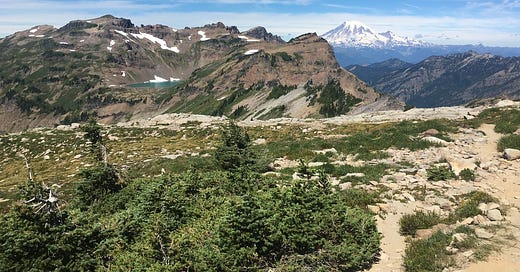



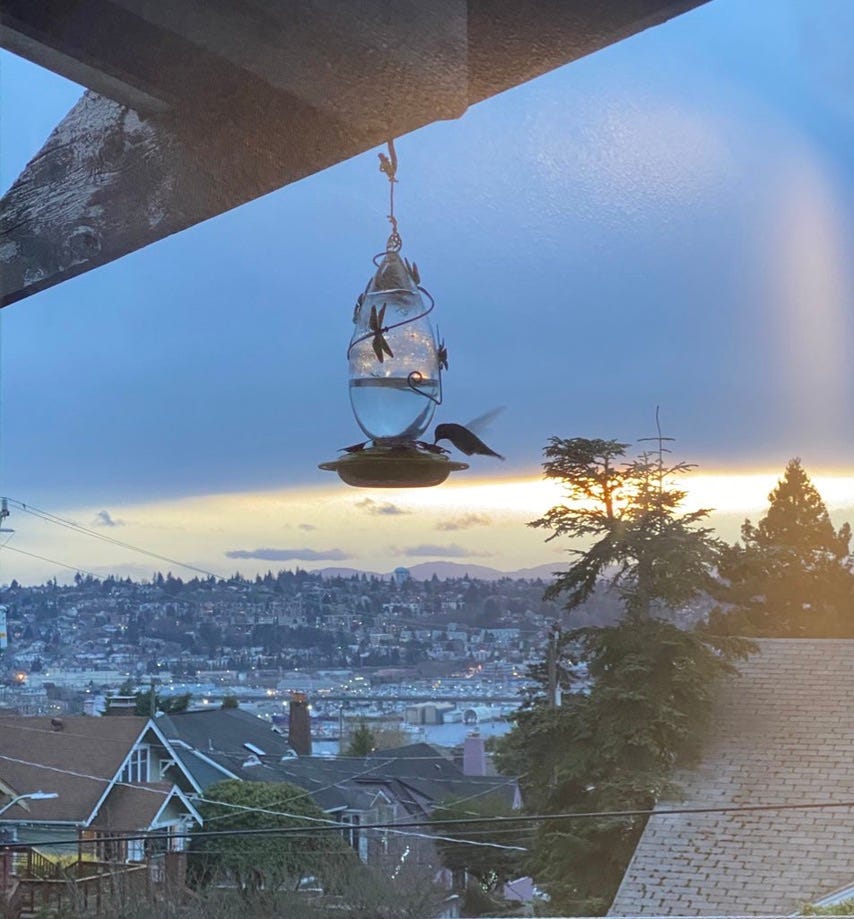
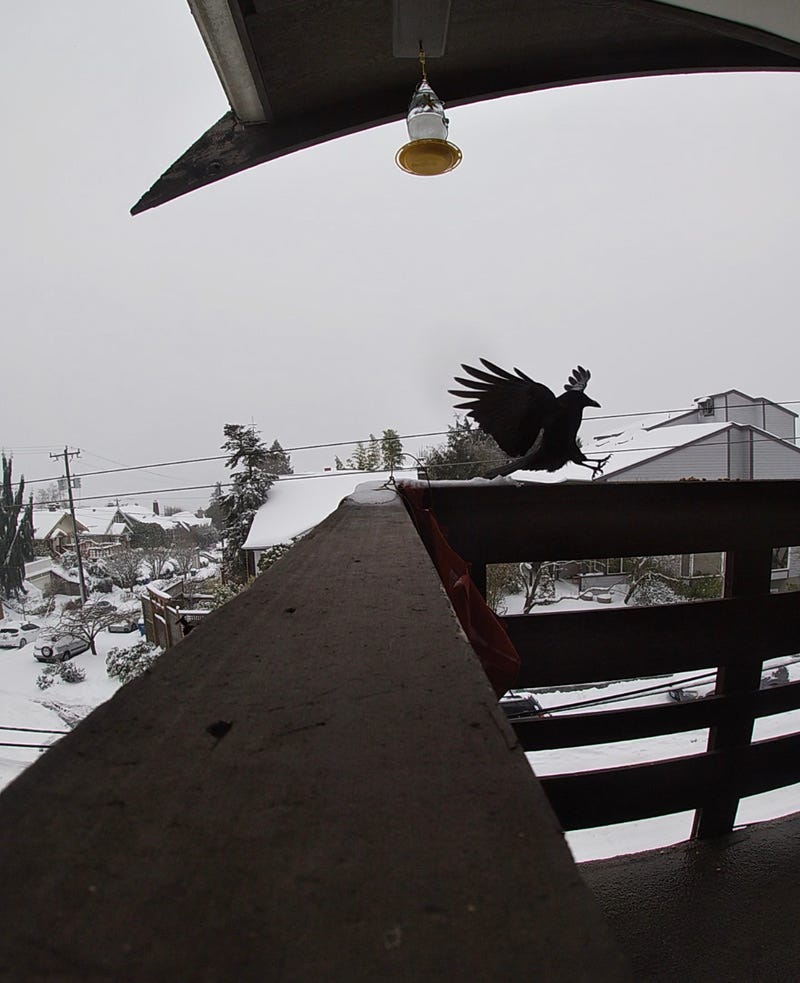
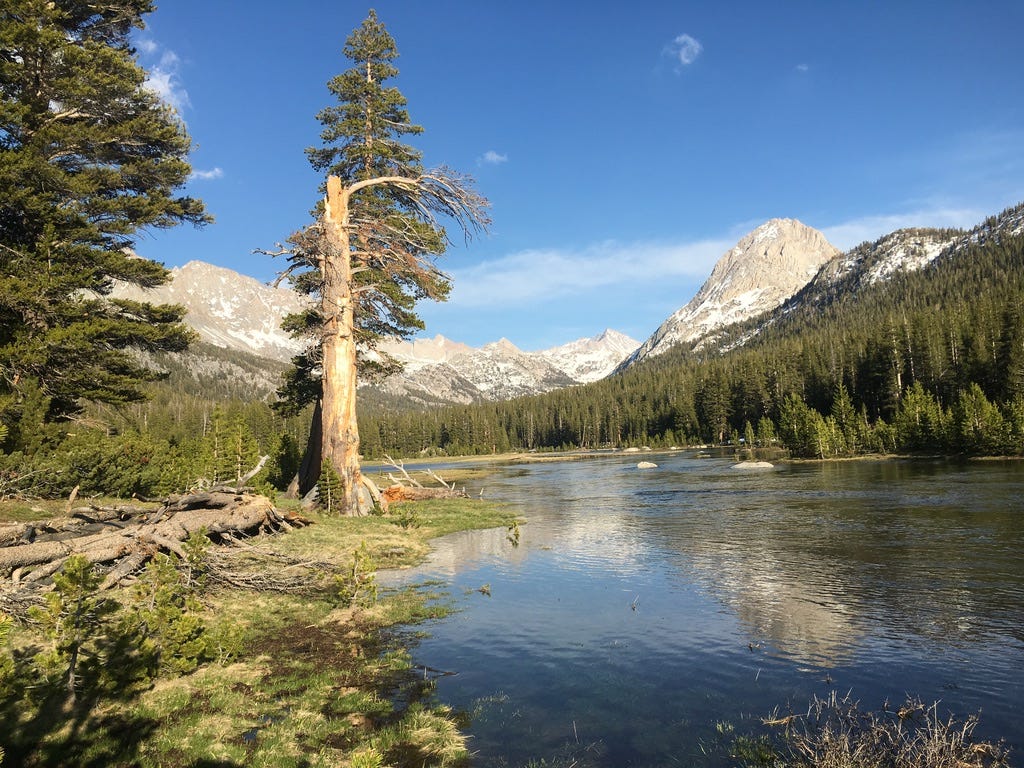
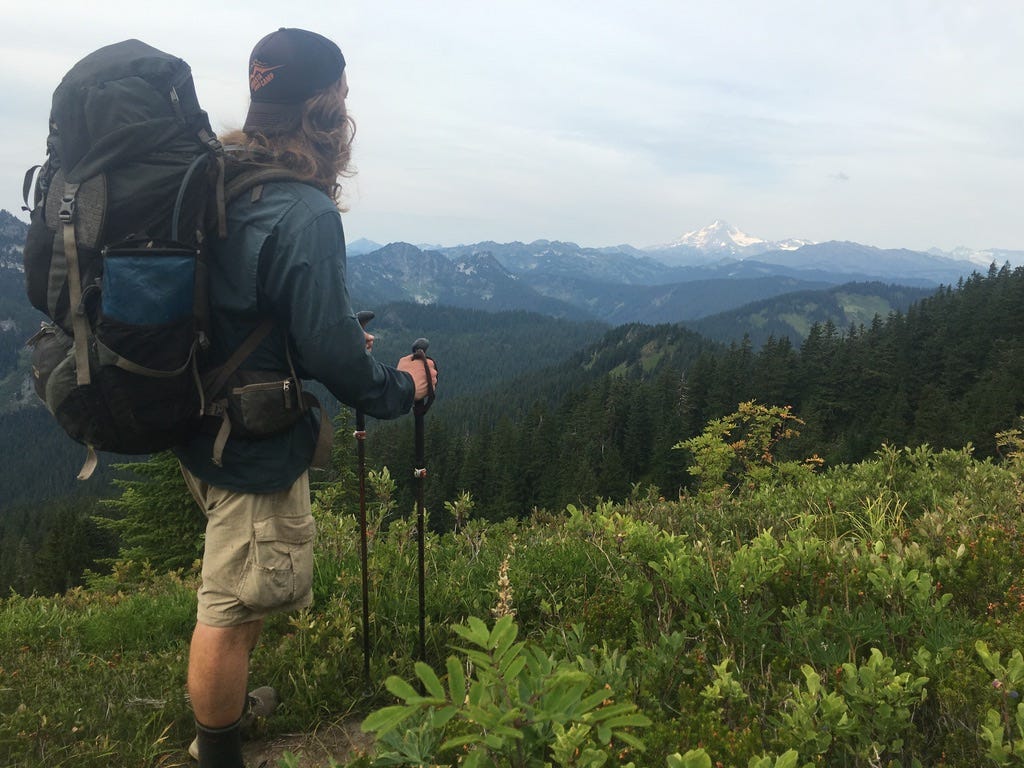
Chuck, you wrote "My goal for this newsletter—when I’m not distracted writing about how rotten the world is—..." and that made me think a few things. First, I think your writing, especially about how rotten the world is, is especially powerful and I hope you keep sharing it.
Second, I wonder if part of your, and many folks writing about politics isn't more closely connected to the theme of this weeks newsletter than we may think. Sure, part of engaging politically is recognizing how dark and inhumane the world around us is, but a part of it is also to highlight the beauty of what communities create. Of how they can, or how we hope to make them, support and invest in human beings and in preserving this world.
"In fact, I think limiting the idea of awe to what can be experienced in nature can be detrimental, as it prevents us from seizing those moments when they arrive elsewhere. "
You writing that made me wonder if the same can't be said of politics. If some of the point of political writing, beyond holding the ugliest excesses of the ruling elites up to a magnifying glass, isn't to try to create awe in communities, in what might be possible. Sometimes that awe is only in comparison, like the awe I felt seeing an extensive mass transit system in Quito simply because I hadn't seen it back home. But sometimes surely that awe can be just at the beauty and tranquility that can come from communities that invest, care about, and nourish each other. In striving to imagine American cities, full of lush parks, farms, gardens, green energy, and jobs for all.
I don't think I have seen much of that firsthand in my life, but I feel some sense of awe in just trying to picture it. And I know that your writing, and the writing of others, helps push me to envision what might be, what it is that is so worth fighting for.
So please keep writing about the awe and majesty of creeks, streams, mountain vistas, and everyday life, but also know that your writing about the ugliness of this world can help others pursue awe. I, for one, will stay out here reading all of it. Love you brother.
Another beautiful, provocative newsletter. Here is why I look forward to Wednesdays -- it's my Meals on Wheels delivery day, which provides great perspective (and occasionally awe) regarding aging and a certain inevitability, and when I get back home I open your newsletter. Most weeks I keep the Tab Open and re-read, re-digest, because there is always a lot there. I have the luxury of appreciation, of time for rituals (coffee and writing in the wee hours of morning is indeed one) and of urgency combined with slowing things down. That last one may seem counterintuitive, but if one is lucky enough, it makes perfect sense.